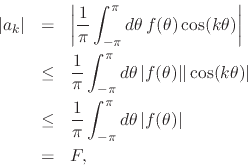Next: Discussion and Extensions Up: Fourier Theory on the Previous: Representability by the Fourier
Finally, let us establish a simple analytic condition over the real
functions that ensures that they are representable by their Fourier
coefficients. If we assume that ![]() is absolutely integrable, so
that the integral
is absolutely integrable, so
that the integral
exists and is a finite real number ![]() , then it follows that we have for
the Fourier coefficients, taking as an example the case of the cosine
series,
, then it follows that we have for
the Fourier coefficients, taking as an example the case of the cosine
series,

where we used the triangular inequalities. It follows that we have, for
all ![]() ,
,
Since we thus see that the Fourier coefficients of ![]() are bounded
within the interval
are bounded
within the interval ![]() , for all
, for all ![]() , it follows that they
cannot diverge to infinity as
, it follows that they
cannot diverge to infinity as ![]() , and therefore that they
satisfy our hypothesis in Equation (3), namely that
, and therefore that they
satisfy our hypothesis in Equation (3), namely that
for all real ![]() . The same result can be established in a similar way
for the case of the sine series, of course. It therefore follows that
. The same result can be established in a similar way
for the case of the sine series, of course. It therefore follows that
![]() is representable by its Fourier coefficients.
is representable by its Fourier coefficients.
If we go back to a more general function ![]() that has both even
and odd parts, since the result holds for both parts, since we may also
add a constant term without changing the result, and since we have limited
ourselves to Lebesgue-measurable real functions within a compact interval,
for which integrability and absolute integrability are one and the same
concept, we are ready to state our second important conclusion:
that has both even
and odd parts, since the result holds for both parts, since we may also
add a constant term without changing the result, and since we have limited
ourselves to Lebesgue-measurable real functions within a compact interval,
for which integrability and absolute integrability are one and the same
concept, we are ready to state our second important conclusion:

It is an interesting observation that this provides an answer to the
conjecture proposed in [1], about whether or not there are any
integrable real functions such that their sequences of Fourier
coefficients ![]() give rise to complex power series
give rise to complex power series ![]() which are
strongly divergent, that is, that have at least one singular point
strictly within the open unit disk. The answer, according to the proof
worked out here, is that there are none, as expected.
which are
strongly divergent, that is, that have at least one singular point
strictly within the open unit disk. The answer, according to the proof
worked out here, is that there are none, as expected.